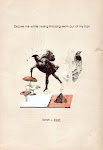As part of a project I recently looked into positive adjectives often paired with “reader.”
The most common is “avid,” which clocks in on google with 14.3 million results. “Avid,” of course, means “with eagerness,” suggesting the person reads gladly. It suggests an attitude rather than a quantity or quality.
Next comes “voracious reader,” with 862,000 results. “Voracious” is most often used in the context of food and suggests a big appetite, thus connoting that a person reads in great quantities.
“Enthusiastic,” a synonym for “avid,” comes in third with 125,000 results. Again it indicates an attitude rather than being necessarily related to taste or quantity.
Then comes “ravenous reader,” with 37,600 results, an alternative to “voracious.”
Then comes the slightly oddball “omnivorous reader,” with 37,300 results.
Let me get all schoolmarmy and say an “omnivorous reader” does not necessarily read heaps of books, although that is implied. Rather, s/he reads indiscriminately, devouring everything from pulp fiction to Balkan history to tofu cookbooks to steampunk sci-fi to crime, etc., regardless of genre. In my opinion, one cannot be “an omnivorous reader of social science,” for example, because it already limits the scope.
While “omnivorous” may emphasize curiosity, it demands the reader cease to be discriminating. In the spirit of abandoning books, is that a positive thing? I start to doubt such a reader exists. You’ve got to care little for what you do with your time.
By the way, last on my list is “prodigious reader,” with 18,700 results. The word “prodigious,” which shares its root with "prodigy," emphasizes accomplishment over appetite, intention or attitude. The first definition in Webster says “wonderful,” and thus this may be the best of all readers.
 Bought: Tickets for Momix Botanica
Bought: Tickets for Momix Botanica




